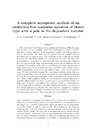Identificador persistente para citar o vincular este elemento:
https://accedacris.ulpgc.es/handle/10553/46294
| Título: | A complete asymptotic analysis of an oscillation free nonlinear equation of bessel type with a pole in the dependent variable | Autores/as: | Mingarelli, A. B. Pacheco-Castelao, J. M. Melkonian, S. |
Clasificación UNESCO: | 12 Matemáticas | Palabras clave: | Ordinary Differential-Equations Positive Solutions Entropy Minimization Elliptic-Equations Integral-Equations, et al. |
Fecha de publicación: | 2010 | Publicación seriada: | Nonlinear Oscillations | Resumen: | We characterize the set of solutions of a nonlinear perturbation of Bessel’s equation of order zero on a half line, where the nonlinearity is analytic in the independent variable, algebraic in the dependent variable, and, indeed, admits a pole in this variable. We show that the equation fails the Painlevé test and that there are no points in [0, ∞), where the blow-up occurs. Although we cannot find even one closed-form solution, it is shown that there are only four families of solutions: asymptotically linear and increasing, asymptotically linear and decreasing, a set of asymptotically constant solutions, and a final set of solutions that admit singularities at finite points on [0, ∞). As a consequence, we show that every solution with or without singularities on [0, ∞) is nonoscillatory and, in fact, has at most two zeros. We also show that the plane Π of real initial conditions (y(0), y′(0)) can be decomposed into a union of connected regions in each of which the solutions are exactly of one of the types mentioned above. Furthermore, we conclude that the set of initial conditions leading to asymptotically constant solutions is a piecewise differentiable curve in Π that can be estimated theoretically to a high degree of precision. In addition, the asymptotic behavior of solutions near a finite singularity is obtained. Estimates relating the growth of solutions to their initial conditions are also described and numerical examples are presented to illustrate the theory. Finally, we observe that every solution of our equation has finite singularities when considered as a solution on the whole line. | URI: | https://accedacris.ulpgc.es/handle/10553/46294 | ISSN: | 1536-0059 | DOI: | 10.1007/s11072-010-0111-3 | Fuente: | Nonlinear Oscillations [ISSN 1536-0059], v. 13 (2), p. 228-259 |
| Colección: | Artículos |
Visitas
87
actualizado el 01-jun-2024
Descargas
110
actualizado el 01-jun-2024
Google ScholarTM
Verifica
Altmetric
Comparte
Exporta metadatos
Los elementos en ULPGC accedaCRIS están protegidos por derechos de autor con todos los derechos reservados, a menos que se indique lo contrario.
